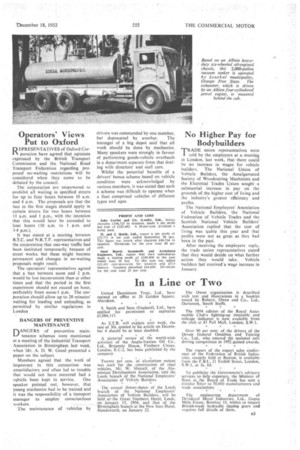Operators' Views Put to Oxford
Page 37

If you've noticed an error in this article please click here to report it so we can fix it.
EPRESENTATIVES of Oxford Cor poration have agreed that opinions expressed by the British Transport Commission and the National Road Transport Federation regarding proposed no-waiting restrictions will be considered when they come to be debated by the council The corporation are empowered to prohibit all waiting in specified streets • for up to faur hours, between 10 a.m. and 4 p.m. The proposals are that the • ban in the first stages should apply in • certain streets for two hours between 11 a.m. and I p.m., with the intention that this would later be extended to • four hours (10 a.m to 1, p.m. and 3-4 p.m.).
It was stated at a meeting between B.T.C. and N.R.T.F. representatives and the corporation that one-way traffic had been instituted temporarily because of street works, but these might become permanent and changes in no-waiting proposals might result.
The operators' representatives agreed that a ban between noon and 2 p.m. would be less inconvenient than at other times and that the period in the first experiment should not exceed an hour, preferably from noon-1 p.m. The corporation should allow up to 20 minutes' waiting for loading and unloading, as permitted by similar regulations in London
DANGERS OF PREVENTIVE MAINTENANCE nANGERS of preventive maintenance schemes were mentioned at a meeting of the Industrial Transport Association in Birmingham last week, when Mr. A. D. W. Good presented a paper on the subject.
Members agreed that the work of improvers in this connection was unsatisfactory and often led to trouble that would not have occurred had a vehiele been kept in service. One speaker pointed out, however, that young mechanics had to be trained and it was the responsibility of a transport manager to employ conscientious v.orkers.
The maintenance of vehicles by drivers was commended by one member.
but deprecated by another. The manager of a big depot said that all work should be done by mechanics. Many speakers were strongly in favour of performing goods-vehicle overhauls in a department separate from that dealing with directors' and staff cars.
Whilst the potential benefits of a drivers' bonus scheme based on vehicle condition were acknowledged by various members, it was stated that such a scheme was difficult to operate when a fleet comprised vehicles of different types and ages.




























































































